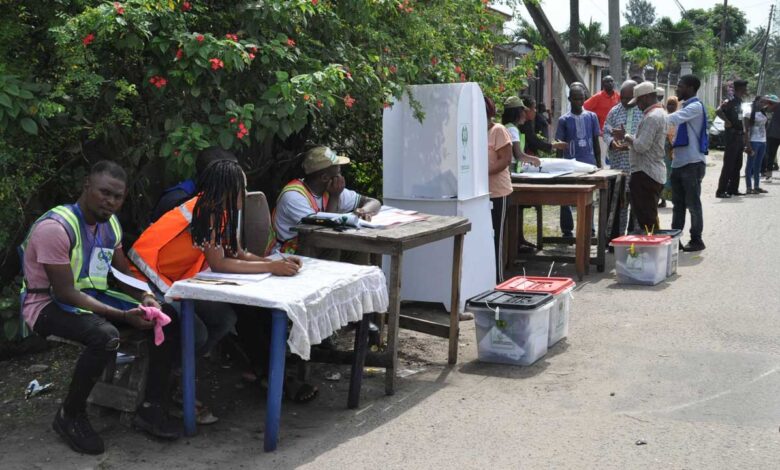The Role Of Insecurity, Militarisation In Fostering Voter Apathy
The involvement of Nigeria’s armed forces in its elections discourages registered voters from participating in the polling exercises.

Nigeria’s elections have been characterised by voter apathy since the return of democracy in 1999. A small percentage of the country’s voting population often determines the outcome, making it somewhat comparable to ‘minority rule’.
As of the time Nigeria conducted its last general elections in 2019, the country had a population of almost 200 million people, with 82.3 million registered voters as collated by the Independent National Electoral Commission (INEC). Out of that number, only 28.6 million voted in the elections.
Of the 28.6 million that voted, President Muhammadu Buhari of the ruling All Progressives Congress (APC) was declared the winner with 15.19 million votes to beat his closest rival, Atiku Abubakar of People’s Democratic Party (PDP), who polled 11.26 million votes.
The 2019 presidential elections recorded the lowest voter turnout since 1999. Though President Buhari polled the majority of the votes, this did not represent the opinion of the majority of citizens who are old enough to cast their ballots.
This means only 34.75 per cent of registered voters exercised their right to vote, making the choice of who is elected into top political offices for the rest of the population.
Many have attributed this apathy to several factors, including insecurity and the over-militarisation of election processes. HumAngle reported how election violence occurs at different stages of the electoral process, with political actors engaging thugs armed with dangerous weapons to disrupt political processes and intimidate voters or their opponents.
Politically-sponsored thugs are often armed with guns, cutlasses, knives, and bottles, which they use to attack and chase people and prevent elections from going as planned.
Already, politics in Nigeria is seen as a dirty game, and this trend does not encourage widespread participation.
Reacting to the recently conducted primary elections marred with violence, Sodiq Ajibade, a Lagos resident who witnessed violence during a poll in Alimosho, told HumAngle that from the level of insecurity, that pervades polls, the 2023 general elections will be marred by violence.
Benjamin Kayode, a businessman, said the fear of possible violence is always the reason for the severe low turnout. According to him, “Having seen the insecurity affecting the country, particularly during the election, I cannot risk my life as a result of casting votes. I would monitor events on television stations.”
To curb insecurity during elections, some soldiers have been observed to act in a manner that undermines the credibility and sanctity of the polls. They have been accused of brute force and invading INEC collation centres in different parts of the country to chase away accredited party agents, election monitors, and journalists.
Nigeria’s Court of Appeal had condemned the illegal militarisation of the Ekiti governorship election in 2014 after voters were subjected to harassment by armed troops. Embarrassed by the indictment, the military authorities set up a panel to investigate the case and subsequently sacked Aliyu Momoh, a Brigadier General, who reportedly led the irregularities.
Even though a Federal High Court had barred the use of military personnel in the conduct of elections in the country, President Muhammadu Buhari gave an ambiguous shoot-on-sight directive against ballot box snatchers and other categories of electoral offenders before the 2019 elections. The directive triggered public outrage, with many arguing that the president was endorsing jungle justice.
The 2019 elections were heavily militarised, with combat-ready soldiers waiting for the final order as they allegedly suppressed voters. In Kwara, Akwa-Ibom, Benue, and River states, residents were reportedly scared as military hardware, jets, and helicopters were deployed to monitor the conduct of elections.
In Rivers state, military personnel blocked local and foreign election observers from gaining access to collation centres. In some cases, they also harassed voters and electoral officers.
According to the United Labour Congress (ULC), heavy militarisation of elections in Nigeria shrinks democratic values and undermines the military personnel’s ability to fulfil their task of protecting the nation’s borders against external enemies.
HumAngle contacted the spokesperson of the Nigerian Army, Onyema Nwachukwu, for comments but he did not respond to calls and text messages. Meanwhile, the Defence Headquarters said in 2019 that the military often takes part in elections in order to support the police in providing security for voters.
But not everyone agrees this should be the case.
“Soldiers have no business in providing extra security on election day but the greed and violence perpetrated during polls have forced their involvement. While the government continues to engage soldiers for militarisation of elections, they do not care about the potential implications,” observed Felicia Akinyemi, a human rights lawyer.
“The conduct of electoral processes in Nigeria do not inspire confidence, especially with the use of force, which reduces the participation of citizens. Many are not partaking in electoral processes because of various antidemocratic norms which lead to violation of human rights.”
She also advised that the authorities should desist from militarisation during polls so as to ensure the participation of more people in selecting leaders that would govern the country in the next four years.
This report was produced in partnership with HumAngle Services.
Support Our Journalism
There are millions of ordinary people affected by conflict in Africa whose stories are missing in the mainstream media. HumAngle is determined to tell those challenging and under-reported stories, hoping that the people impacted by these conflicts will find the safety and security they deserve.
To ensure that we continue to provide public service coverage, we have a small favour to ask you. We want you to be part of our journalistic endeavour by contributing a token to us.
Your donation will further promote a robust, free, and independent media.
Donate HereStay Closer To The Stories That Matter




